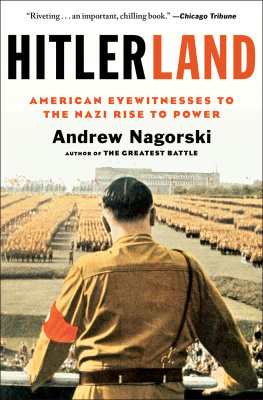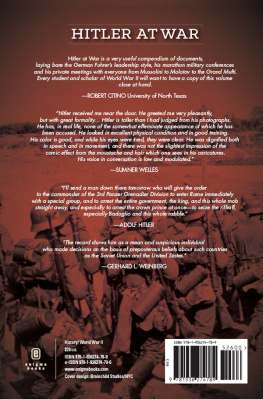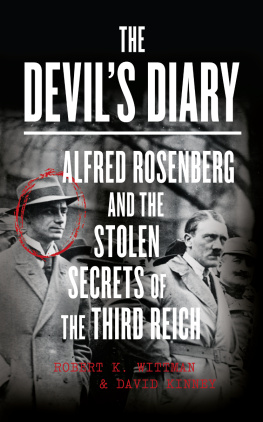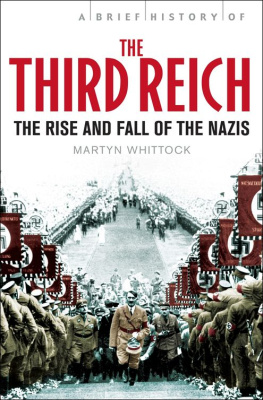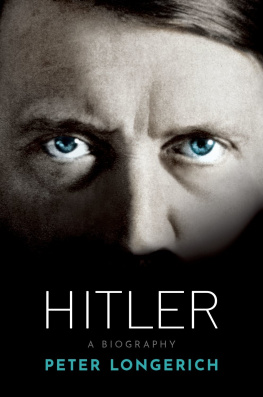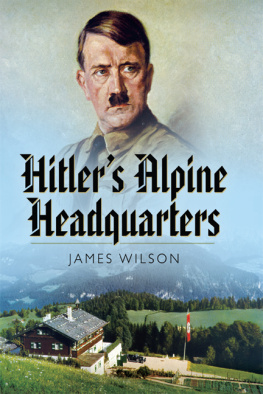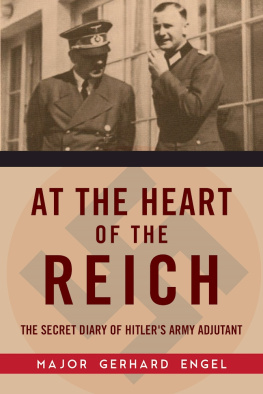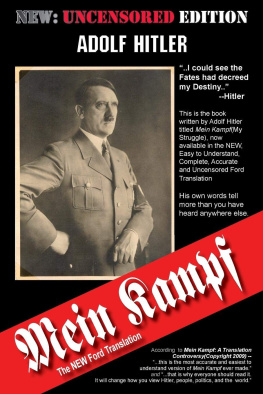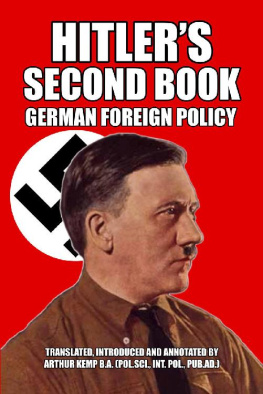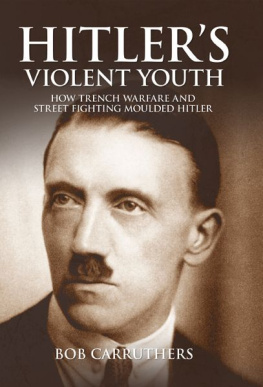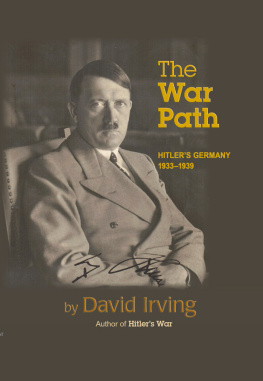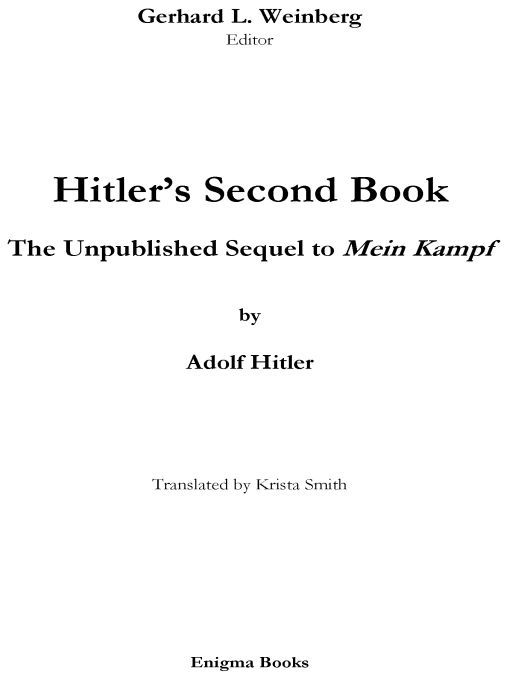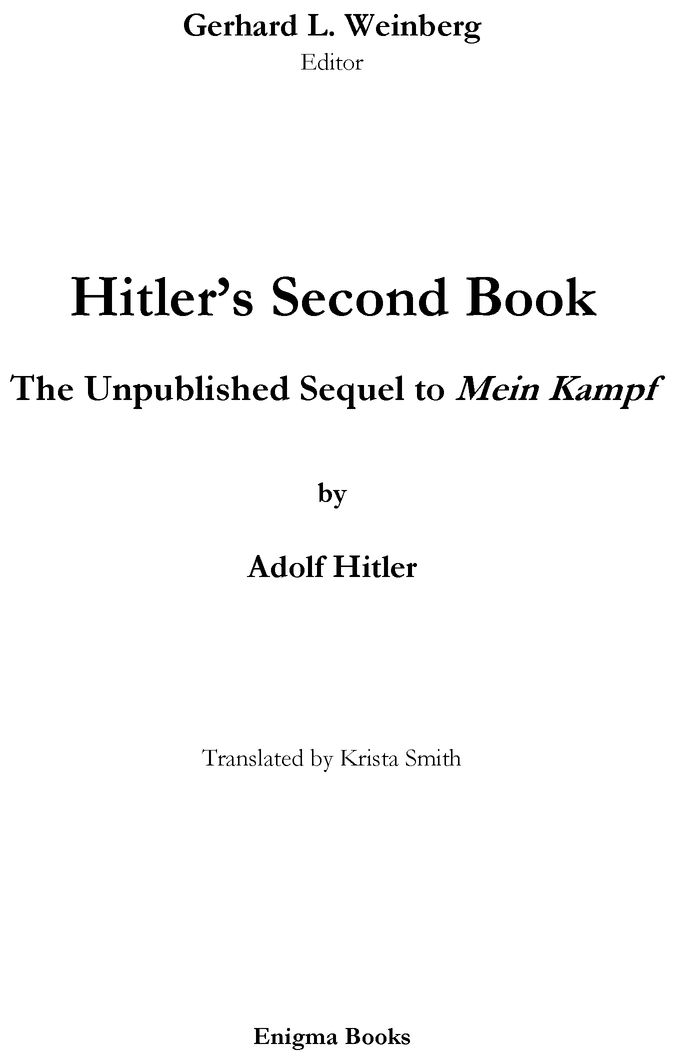Table of Contents
Also published by Enigma Books
Hitlers Table Talk
1941-1944
In Stalins Secret Service
Hitler and Mussolini:
The Secret Meetings
The Jews in Fascist Italy:
A History
The Man Behind the Rosenbergs
Roosevelt and Hopkins:
An Intimate History
Diary 1937-1943
The Battle of the Casbah:
Terrorism and Counter-Terrorism in
Algeria 1955-1957
Secret Affairs:
FDR, Cordell Hull, and Sumner Welles
Hitler and His Generals:
Military Conferences 1942-1945
Stalin and the Jews: The Red Book
The Secret Front:
Nazi Political Espionage 1938-1945
Fighting the Nazis:
French Military Intelligence and
Counterintelligence 1935-1945
A Death in Washington:
Walter G. Krivitsky and the Stalin Terror
Hitlers Second Book
The Unpublished Sequel to Mein Kampf
At Napoleons Side in Russia:
The Classic Eyewitness Account
The Atlantic Wall:
Hitlers Defenses for D-Day
Double Lives:
Stalin, Willi Mnzenberg, and the
Seduction of the Intellectuals
France and the Nazi Threat:
The Collapse of French Diplomacy
1932-1939
Mussolini:
The Secrets of His Death
Top Nazi
Karl Wolff: The Man Between
Hitler and Himmler
Empire on the Adriatic:
Mussolinis Conquest of Yugoslavia
The Origins of the War of 1914
Hitlers Foreign Policy
1933-1939
The Origins of Fascist Ideology
1918-1925
Max Corvo:
OSS Italy 1942-1945
Hitlers Contract
The Secret History of the Italian Edition of Mein Kampf
Foreword
by Gerhard L. Weinberg
Until 1958 the actual document of what became known as Hitlers Second Book remained hidden within the archives of captured German records in Alexandria, Virginia, where I located it. Hitler had dictated the text in 1928 but never had it published. In 1961 the Institute for Contemporary History in Munich published the book with the title, Hitlers Zweites Buch: Ein Dokument aus dem Jahr 1928 (Hitlers Second Book: A Document of the Year 1928).
The availability of a reliable English-language text is especially important for English-speaking readers and Americans in particular because beyond the repetition of such themes from Hitlers earlier work, Mein Kampf, as the eternal struggle for land, the racial basis of all history, the need for Germany to conquer additional living space, and the endless repetition of the importance of fighting an imaginary Jewish enemy, there are also themes of particular relevance today. There is far more extensive discussion of the United States than can be found elsewhere. It is somewhat more positive than his later remarks, and it culminates in the assertion that a Nazi government of Germany would have as one of its major responsibilities the preparation of the country for war with the United States. This belief of Hitlers may make it easier for Americans to understand why, as soon as the initial rearmament steps of Hitlers government had in his eyes reached the point at which the weapons needed for war with Britain and France were well on the road to full production, he gave orders in 1937 for the development of the inter-continental bombers and super-battleships he considered necessary for war against the United States. And this at a time when the United States Congress was busy passing the so-called neutrality laws.
There are, furthermore, still those who imagine that Hitler hoped to reverse the losses Germany had incurred through the 1919 Peace Treaty of Versailles. As he constantly asserted in his speeches and explains in detail in this work, that was the last thing Germany needed. In his eyes, the demand for this by other German politicians only showed what utter fools they were. A National Socialist government would never follow such a route; it would fight wars for hundreds of thousands of square kilometers of land, not the little snippets that Germany had lost in 1919 and that would never suffice for the Germans to feed themselves on their own land. And, if Germany was to dominate the globe, obviously, as he points out in this work, the end of each war that he would lead for massive additional land would only provide the basis for the next conflict.
Both in the thinking of some and in Nazi propaganda during the war, there is the notion of Germany as a bulwark against Bolshevik Russia. In Hitlers racial perception of history, however, the Bolshevik Revolution became a racial displacement of the allegedly Germanic ruling elite of the Tsarist regime by a bunch of incompetents now ruling racial inferiors. It was, therefore, a stroke of great good luck for a German government that saw in this the easier opportunity to seize land for settlement in Eastern Europe.
Neither the inter-continental bombers nor the super-battleships were ever built; and the derogatory view that Hitler had of Slavic (and one should say Chinese) people turned out to be grossly mistaken; but a revolution halted in its tracks cannot be understood without attention to the beliefs of those in charge and the goals toward which they thought themselves headed. Those who are interested in understanding one of the major and most evil figures of the twentieth century will find Hitlers exposition of his own views essential.
Since the 1961 German-language edition of this book quickly went out of print and there was new evidence about the manuscript and additional relevant scholarship, the Institute of Contemporary History in Munich decided ten years ago to include the text of the document with a revised introduction by myself, and additional notes provided by members of the Institute staff, Christian Hartmann and Klaus A. Lankheit, as a special volume in its comprehensive edition of Hitlers speeches and writings. The intent to publish, at the time, a carefully translated and edited edition in the English language that would immediately follow the original German one was aborted by the appearance of a pirated edition which appropriated many of my notes but was neither carefully translated nor properly annotated.
In the Foreword of the original German edition I thanked a number of individuals who had helped me at that time. In addition, special thanks are due to Dr. Albrecht Tyrell, who provided me with significant archival information incorporated in the Introduction and to the staff members of the Institute of Contemporary History in Munich. I am very pleased that Enigma Books has decided to publish a carefully prepared English-language edition of this important source. The only extensive work dictated by Adolf Hitler other than Mein Kampf is therefore now accessible to those in the English-speaking world.
Although as editor I accept responsibility for the introduction and commentary, the authorAdolf Hitleris responsible for the contentrambling, repetitive, and highly questionable from both a factual and a moral perspective. Sixty years after World War II it is surely important to show again how directly Hitlers thinking led to the great catastrophe.
Gerhard L. Weinberg
October 2003
Introduction
by Gerhard L. Weinberg


